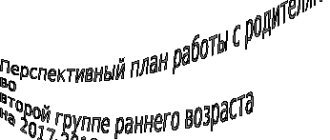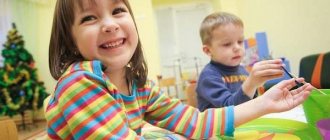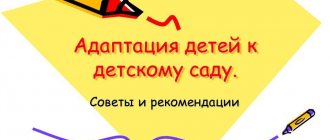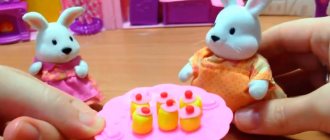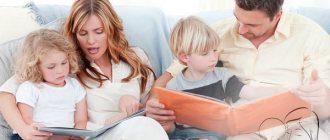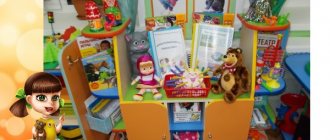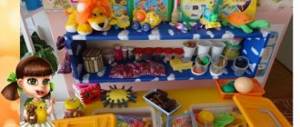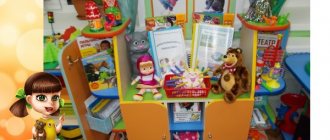Modern forms of working with parents in early childhood groups
Natalia Lanina
Modern forms of working with parents in early childhood groups
Report
about the use of modern forms with parents in an early age group .
The content of work with parents is implemented through various forms . The main thing is to convey knowledge to parents . There are traditional and non-traditional forms of communication between teachers and parents of preschool children , the essence of which is to enrich them with pedagogical knowledge. In my work , I use both traditional and non-traditional forms of communication with parents . Traditional forms include parent meetings , lectures, workshops; non-traditional forms include workshops, master classes, excursions, parent clubs , promotions, recreational activities, games, etc.
One of the forms of information and analytical work that I actively use in practice, allowing me to adjust and supplement the developed system of activities, is a mailbox. A mailbox is installed in the group's .
Parents have the opportunity to add notes with their ideas and suggestions, and ask questions of interest. Questions asked are discussed at parent meetings or given in writing. This form of work allows parents to share their thoughts in absentia when I cannot meet with parents in person .
The main role in my practice continues to belong to such collective forms of communication as meetings, conferences, , etc. These forms have been used before. However, today, following the principles of the Federal State Educational Standard, communication between teachers and parents occurs on the basis of dialogue, openness, sincerity in communication, refusal of criticism and evaluation of the communication partner. Therefore, these forms are considered by me as non-traditional. For example, I practice holding parent meetings based on famous television games: “KVN”
,
"What?
Where? When?" .
An informal approach to organizing and conducting these forms of communication poses the need to use a variety of methods for activating parents . I also think mini-meetings
are an effective non-traditional form of working with parents An interesting family is identified and its experience of upbringing is studied. Next, she invites two or three families who share her position in family education. Families who are searching for an issue that will be discussed at mini-meetings are also invited to such meetings, where the experience of family education is studied and shared. Group parent meetings are a form of work between a teacher and a group of parents , a form of organized familiarization with the tasks, content and methods of raising young in a kindergarten and family. The agenda of the meetings is varied, taking into account the wishes of the parents . For example, I often suggest topics such as: “Do you know your child?”
,
“Training obedience in children”
,
“Methods of pedagogical influence”
,
“Is your child obedient?”
,
“How to play with a child?”
,
“Should children be punished?”
and etc.
Experience shows that parents respond more actively to individual invitations, especially if children took part in their preparation. work often use an individual form of communication with parents ; This is one of the most accessible forms of establishing connections with family. A conversation can be either an independent form or used in combination with others, for example, it can be included in a meeting or family visit. When planning the topics of conversations, I strive to cover, as far as possible, all aspects of education. As a result of the conversation, parents should gain new knowledge on the issues of teaching and raising a preschooler. I organize thematic consultations with the aim of answering all questions that interest parents . Part of the consultation is devoted to the difficulties of raising children.
A separate group consists of visual information methods . They introduce parents to the conditions , tasks, content and methods of raising children, help overcome superficial judgments about the role of kindergarten, and provide practical assistance to the family. These include recordings of video fragments of the organization of various types of activities, routine moments, classes; photographs, exhibitions of children's work , stands, screens, sliding folders.
Leisure forms of organizing communication with parents help me establish warm relationships with parents , as well as more trusting relationships between parents and children . in this group of forms the holding of such joint holidays and leisure activities in a group as “New Year's Eve”
,
“Christmas fun”
,
“Maslenitsa”
,
“Mom’s Holiday”
,
“Best Dad
,
“Dad, Mom, I am a friendly family”
,
“Harvest Festival”
, etc.
Such evenings help create emotional comfort in the group and bring together the participants in the pedagogical process. Parents can show their ingenuity and imagination in various competitions. The use of leisure forms contributes to the fact that, thanks to the establishment of a positive, emotional atmosphere, parents become more open to communication; in the future, it is easier for teachers to establish contacts with them and provide pedagogical information .
The use of various forms of work has yielded certain results: parents from “spectators and “observers”
became active participants in meetings and assistant teachers, an atmosphere of mutual respect was created.
Parents began to show sincere interest in the life of the group , learned to express admiration for the results of their children’s activities, and emotionally support their child. 100% of parents attend parent-teacher meetings and actively participate in holidays and entertainment.
Organization of work with parents in an early age group; methodological development (junior group)
Municipal state preschool educational institution Savinsky kindergarten No. 2
Organization of work with parents in an early age group
Prepared by: Gruzdeva V.M.
teacher of 1st junior group
2019
In conditions when the majority of families are concerned with solving problems of economic and sometimes physical survival, the tendency of many parents to withdraw themselves from solving issues of upbringing and personal development of the child has increased. Parents, not having sufficient knowledge of the age and individual characteristics of the child’s development, sometimes carry out upbringing blindly, intuitively. All this, as a rule, does not bring positive results. Article 18 of the Law of the Russian Federation “On Education” states: “Parents are the first teachers. They are obliged to lay the first foundations for the physical, moral and intellectual development of the child’s personality at an early age.” Family and kindergarten are two social institutions that stand at the origins of our future, but often they do not always have enough mutual understanding, tact, and patience to hear and understand each other. Misunderstanding between family and kindergarten falls heavily on the child. It is no secret that many parents are only interested in their child’s nutrition and believe that kindergarten is a place where they only look after their children while parents are at work. And we, teachers, very often experience great difficulties in communicating with parents for this reason. Therefore, having recruited a group of kids, I began to work on the problem of interaction between kindergarten and family.
For the coordinated work of the kindergarten and parents, I set myself the following tasks: 1. Activate and enrich the educational skills of parents.
2. Work closely with the families of your students.
For this purpose, I used active forms and methods of working with parents:• group parent meetings;• consultations;• exhibitions of children's works made together with parents;• Days of good deeds;• participation of parents in the preparation and conduct of holidays and leisure activities;• design of photomontages ;• joint creation of a subject-development environment;• work with the parent committee of the group;• Trust telephone;• Trust mail; As a result, the level of educational activities of parents increased, which contributed to the development of their creative initiative.
Work to involve parents in the joint activities of the preschool educational institution was carried out in four directions.
Information and analytical direction
Cognitive direction
Visually - information direction
Leisure direction
In order to study the family, clarify the educational needs of parents, establish contact with its members, and coordinate educational influences on the child, I began work with a questionnaire. Having received the real picture, based on the collected data, I analyzed the peculiarities of the structure of family ties of each child, the specifics of the family and family education of the preschooler, and developed the tactics of my communication with each parent. This helped me better understand the pedagogical needs of each family and take into account its individual characteristics. This analysis made it possible to identify three groups of parents: 1. Parents are leaders who know how and enjoy participating in the educational process and see the value of any work of a child care institution.2. Parents are performers who participate subject to significant motivation.3. Parents are critical observers. A change in the perception of parents as participants in the educational process has led to a change in the understanding of the types of families: active participants in the educational process, interested in the success of their children; interested, but wanting to solve problems with the help of specialists; indifferent, living by the principle “I was raised the same way.” I had the opportunity to have a differentiated approach to parents during joint events.
Cognitive direction
The cognitive direction is to enrich parents with knowledge in matters of raising preschool children. Our group has created all the conditions for organizing a single space for the development and upbringing of a child. The joint work of preschool education specialists (teacher - psychologist, nurse) to implement the educational program provides pedagogical support for the family at all stages of preschool childhood, making parents truly equally responsible participants in the educational process.
Visually - information direction
The visual and informational direction includes:• parent corners• folders - transfers of various subjects• family and group albums “Our Friendly Family”• family vernissage “My Best Family”, “Family - a Healthy Lifestyle”• piggy bank of Good Deeds, etc. The form of work through parent corners is traditional. In order for it to be effective and help me activate parents, I use the headings: “What and how to keep a child occupied at home”, “We asked - we answer”, “Grow up”, “Thank you”, “This is interesting”, “Let’s play”, “With all my heart,” “Pay attention.” They contain practical material that makes it possible to understand what a child does in kindergarten, specific games that you can play, tips, and assignments. The activity of parents in creating photo newspapers and exhibitions suggests that these forms of work are in demand. The visual information direction makes it possible to convey any information to parents in an accessible form and tactfully remind them of parental duties and responsibilities.
Leisure direction
The leisure area in working with parents turned out to be the most attractive, in demand, useful, but also the most difficult to organize. This is explained by the fact that any joint event allows parents to: see from the inside the problems of their child, difficulties in relationships; test different approaches; see how others do it, that is, gain experience interacting not only with your child, but also with the parent community as a whole.
The group held: • joint projects “My Mom is the Best” • sports festival “Dad Can!” • birthday celebrations (monthly), • New Year's matinee. Planned • exhibitions of family collections, relics “From Grandma's Chest”, • performances “Teremok”. "Kolobok" We celebrate the “Birthday” holiday for children in the group every month. It is planned to hold an annual campaign: “Just like that”, “Give a book to children”. Many people have books and toys at home that their children have “grown out of.” How many educational moments are hidden in this small event! This includes caring for old things; At the same time, children learn not only to accept gifts, but also to give them - this is a lot of work, education of the soul. I would like to talk about one important point in the system of working with parents. Every person, having done some work, needs an assessment of his work. Our parents need this too. “Praise is useful if only because it strengthens us in benevolent dimensions,” wrote F. La Rochefoucauld. I think this is true always and everywhere. We thank our parents by presenting them with certificates and gratitude for their active participation in the life of the group. In modern conditions of kindergarten it is difficult to do without the support of parents. That is why a lot of things have been done in our group with the help of the fathers and mothers of our children. With the help of parents, the group is designed in such a way that every corner is used for the development of children: a lot of toys, a “hospital”, a “hair salon”, a “shop”. Children simply love to play in a cozy kitchenette with a sink and stove, beautiful dishes. Trusting relationships were gradually established in the joint activities of parents and the teacher. So, as part of the “Days of Good Deeds” campaign, I organized the repair of toys, furniture, a group, and a walking area together with my parents; the parents provided assistance in creating a subject-based development environment in the group, thereby managing to establish an atmosphere of peace and warm relationships between the teacher and parents. Together we must strive to make the children in the group feel good and comfortable. The upbringing and development of a child is impossible without the participation of parents. In order for them to become teacher assistants and develop creatively together with children, it is necessary to convince them that they are capable of this, that there is no more exciting and noble thing than learning to understand your child, and, having understood him, helping in everything, being patient and delicate and then everything will work out.
